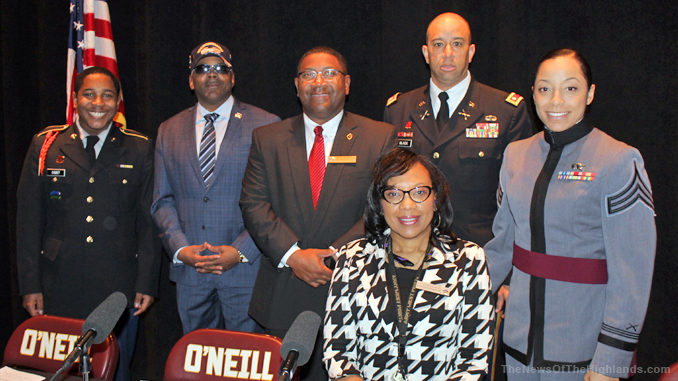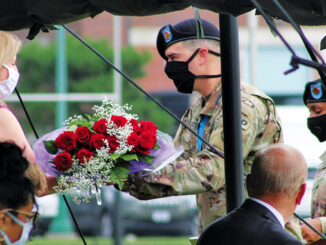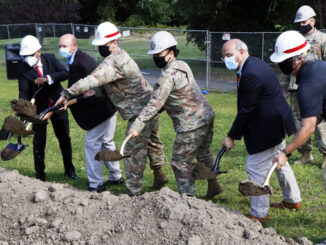
O’Neill’s Black History Month assembly was last week
The entire student body of James I. O’Neill High School was the guest of the school’s JROTC Squadron at a Black History Month program on the morning of February 5.
The event was the third annual, and featured a panel of African American dignitaries who spent well over an hour answering questions from students about their lives and careers and obstacles they’ve overcome, as well as listening to advice on how to get to where they want to be.
The panelists included:
Lt. Col. Rick Black, who is a history professor at West Point. Black is a 1990 graduate of O’Neill High School, and a 1994 graduate of West Point;
Dr. Aundrea Matthews, who also attended O’Neill High School, and then graduated from Texas Christian University and Rice Uni-versity. She is the cultural arts director at Eisenhower Hall;
Retired Lt. Col. Terry Allbritton, who serves as the chief of West Point’s Office of Diversity, Inclusion and Equal Opportunity;
Tyrone King, a retired Army Sgt. Major who also attended O’Neill High School. He is the founder of S4L Entertainment and Sports Management, and a sitting member of the Town Board;
and, Cadet Denise Black-man, a native of Columbus, Georgia, who will graduate into the Army’s Infantry Branch in May.
The event was coordinated by JROTC Cadet Victor Cadet. At the close of the event, he was awarded with a plaque recognizing his receipt of the Buffalo Soldiers Association of West Point’s Youth Leadership award for 2020.
O’Neill Principal Debbi Brand welcomed students and the panelists to the assembly.
“Black History Month isn’t only about looking at the people who have made history, but it’s also about looking at the people who are making history.”
She called the panelists “extremely distinguished and accomplished people who are doing just that”.
“What you will hopefully see today is that making history is not just about changing the world, and changing the story of the world, but about changing history in your corner of the world.”
The students had submitted questions in advance of the assembly.
Here are a couple of the questions, and the answers from the panelists.
What were your goals growing up, and how have they evolved?
Allbritton told the students he had a very clear goal of his life as a high schooler — “I wanted to go into the NFL,” he said. “I realized later on that NFL stands for Not For Long. I was lucky enough to get a scholarship and went on to play football in college, and that’s where that dream ended. But, I joined the ROTC and my career took off.”
He urged the students to be passionate about whatever goals they do set as they move forward in life.
Black said he feels that his goals continually have changed as he has aged, and as he has been exposed to new and different things.
“Like a lot of you, I think I probably had a lot of different goals growing up, including teaching and sports management,” he said. “But I eventually fell in on the military, through West Point.”
Blackman had a similar response, saying she still doesn’t know what she wants to be when she grows up — “But I do have goals. Number one, I want to be a good person. I also want to always respect others, and to learn from my mistakes.” Blackman confessed to the students that she can vividly recall a period in high school where she “truly was a bully”.
Matthews told the students the story of how she wanted, “for sure” to be a systems analyst and work with computers as an adult.
“But, I ended up with a PhD in religious studies,” she said. “I wanted to change the world with computers, but I’m changing the world with faith and the arts.”
When Blackman spoke, she’d had students who knew what they want to do with their lives stand up; about one-third of the students in the auditorium did. When King spoke, he gave a shout-out to all of the students who remained seated.
“I’m not so sure when I was sitting in those seats I had any goal other than to make it out of high school,” he said. “To all the people who stayed sitting down, that’s just fine. Sometimes we don’t have all the answers, and I think it’s okay that you don’t necessarily know yet what you want to do. The good news is that every day when you get up, you have another day to figure it out.”
What are some the challenges you’ve had to face and how did you overcome them?
Black reminded the students that there will always be challenges to face.
“Right now, for many of you, it may be mid-term exams you just completed,” he said, and noted that he can relate to that because one of his greatest challenges was earning his PhD. “It was an intellectual, an organizational and a time management challenge, but finishing it was also a great moment of pride for me.”
Black also joked that parenting remains a great challenge for him — his son, a sophomore, was in the auditorium that afternoon.
King told the students that his Army basic training was a challenge he wasn’t sure he could overcome, but, in nearly 30 years in the Army, he went on to obtain the highest enlisted rank.
“You know what got me through?” he said. “The words of one of my old middle school coaches, Dr. Dave Baker.
Allbritton and King also both talked about the stress of leading soldiers into war.
“When you become a leader of people,” Allbritton said, “those people depend on you. I’m proud to say that every soldier under my command came back … no loss of limb, no loss of life.”
Blackman, closest in age to the students, said sometime she is her own biggest challenge — and often she needs to remind herself she is good enough, smart enough and fast enough to be at West Point.
“You guys are going through so much right now, I know,” she said of the students’ life in high school. “You are good enough, you have done enough, you matter. Those words that you say to each other and to yourself, help you overcome it.”
Matthews spoke about how she has “never let other people define me, and never let the circumstances of the world determine who I was going to be, and I demanded to be included in whatever was going on.”
Specifically as a person of color, what obstacles have you overcome?
These answers were similar to the last question — “self doubt”, “Imposter Syndrome” (when you’re in a place and you don’t think you belong there), “the obstacle of people watching too much reality TV and believing stereotypes”.
Their advice to the students? No matter what your skin color is, be confident in yourself.
“The more you doubt yourself, the easier it becomes for other people to pile on that doubt,” Black said.
And from Blackman:
“How do you get over Imposter Syndrome? Just remind yourself ‘hey look, I’m here and I’ve just got to be awesome.”
After those three questions, individuals were asked questions, and as time ran out, the students who remained standing to ask questions were invited to the school’s library for a reception with the guests to talk further.
Among those final questions asked was about what do the panelists think Dr. Martin Luther King would think about the racial climate of the United States today.
Several answers were given, but King turned it back to the students.
“I’d like to ask how do you feel about the current climate,” he said. “And then I’d like to challenge each of you to do something to make it better.”
At the end of the presentation, JROTC instructor Lt. Col. (ret) Brad Damschen presented each of the panel members with an O’Neill High School JROTC Buffalo Soldier Squadron challenge coin. He said they were the first of the coins they had given out.



